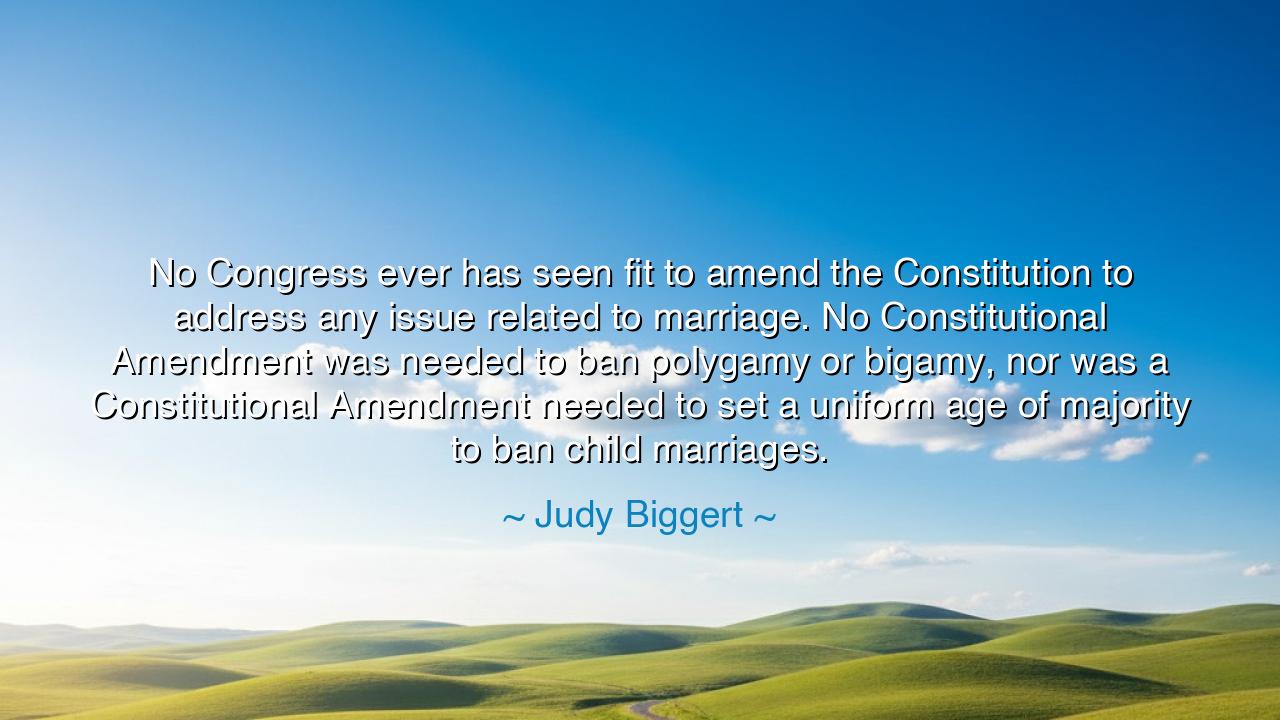
No Congress ever has seen fit to amend the Constitution to
No Congress ever has seen fit to amend the Constitution to address any issue related to marriage. No Constitutional Amendment was needed to ban polygamy or bigamy, nor was a Constitutional Amendment needed to set a uniform age of majority to ban child marriages.






In the vast and solemn halls of governance, where the destinies of nations are shaped and the laws of men are weighed upon the scales of justice, the words of Judy Biggert rise like a voice of reason amidst the thunder of debate: “No Congress ever has seen fit to amend the Constitution to address any issue related to marriage. No Constitutional Amendment was needed to ban polygamy or bigamy, nor was a Constitutional Amendment needed to set a uniform age of majority to ban child marriages.” In these words lies both history and humility—a recognition that marriage, though sacred and central to the human story, has always found its governance within the fabric of society, not the steel of constitutional decree.
From the beginning of the American experiment, the Constitution was not meant to be a weapon for every passing storm of emotion or fear. It was crafted as a living covenant—a framework vast enough to contain freedom, yet firm enough to guard against tyranny. When Biggert spoke, she echoed the wisdom of the Founders themselves, who knew that not every question of morality demands an amendment, and not every shifting wind of culture must be carved into stone. To amend the Constitution is to touch the heart of the nation; it must be done only when the spirit of the people cries out in one accord. But on matters of marriage, the law of the land has always trusted the people and the states to find balance through justice and compassion.
Indeed, history bears witness to this truth. When the early republic confronted the challenge of polygamy, it did not seek to alter the nation’s founding charter. The courts and legislatures, wielding the powers already granted, declared such practices contrary to the public good. Likewise, when the question of child marriage arose, the people themselves, through their states, raised the age of consent not by constitutional mandate but by the voice of conscience and reason. Thus, progress was born not from rewriting the Constitution, but from fulfilling its enduring promise—to form a more perfect union through the wisdom of each generation.
There is in Biggert’s words a reverence for restraint, a recognition that power, even when wielded for noble causes, must be tempered by wisdom. The ancients taught that to touch the foundation of a great temple is to risk its collapse. So too with constitutions and covenants: one must not rebuild them with every new desire, lest their strength be lost. To preserve the majesty of law, one must discern between what is eternal and what is temporal, between the foundation that holds the house and the furnishings that change with the years.
Let us recall the story of Solon of Athens, the wise lawgiver who, when asked whether his laws were perfect, replied: “They are as perfect as the people can bear.” Solon understood, as Biggert reminds us, that law must be both rooted and flexible—rooted in principle, yet pliable enough to adapt to the growth of the people. When a nation amends its core charter too freely, it risks becoming a reed bent by every wind. But when it trusts its citizens to govern with justice within the existing framework, it proves its own maturity.
And so, the lesson that flows from these words is both civic and spiritual: not every challenge demands the rewriting of law; some demand the renewal of the heart. True reform begins not with ink upon parchment, but with conscience awakened and compassion enacted. The Constitution was forged not merely to restrain government, but to inspire a people capable of governing themselves. If the people are just, the laws will be just. If the people are wise, the nation will endure without the need for endless correction.
Therefore, let this teaching be passed on to all who would shape the destiny of nations: preserve the sanctity of your foundations. Guard against the vanity that believes every cause must reshape the whole. When injustice arises, act with courage; when change is needed, move with clarity—but do not mistake the vessel for the spirit it contains. Equality, justice, and liberty do not come from amendments alone, but from the steadfast hearts of those who live them daily.
So walk wisely, children of tomorrow. Let your laws be strong yet merciful, your convictions firm yet humble. Honor the Constitution not as a cage for freedom, but as the ancient tree beneath whose branches justice may grow anew. And remember always the wisdom of Judy Biggert’s words: that sometimes the greatest strength of a nation lies not in how often it amends its laws, but in how faithfully it lives by the timeless truths already written upon its soul.






AAdministratorAdministrator
Welcome, honored guests. Please leave a comment, we will respond soon